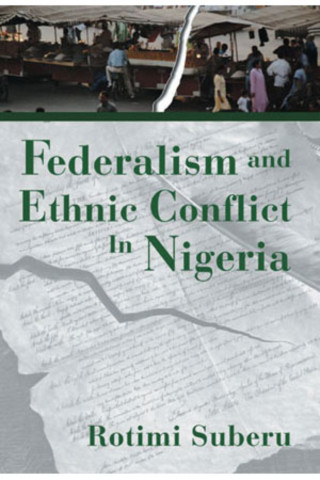Federalism and Ethnic Conflict in Nigeria
Nigeria is Africa’s most populous country; its citizens are perhaps the best educated on the continent. It is the world’s sixth-largest producer of oil. Nigeria also has probably the most elaborate system of government in the region. Yet the country teeters perilously close to massive civil upheaval.
In this compelling new work, Suberu examines the profound political contradictions that make up Nigeria, a nation whose leaders have constantly tinkered with a colonial federal legacy that sought to balance the country’s three major ethnic groups. He explores the evolution of Nigerian federalism through its various constitutional experiments and administrative redesigns, including those in the periods of military rule.
While acknowledging the genius of Nigerian federalism in trying to subdue ethnic and regional conflict, Suberu expertly analyzes the troubling flaws in a system that breeds corruption, prioritizes distribution over development, and encourages the country’s further political fragmentation.
In the book’s final chapter, Suberu outlines bold constitutional reforms that seek to promote institutional innovation in Nigerian federalism to keep pace with the country’s growing demographic and ethnopolitical complexity.
Rotimi Suberu
Rotimi Suberu currently teaches politics and international relations. Previously, he taught political science at the University of Ibadan, Nigeria, where he obtained his PhD in 1990. His main research interests are Nigerian government and politics, the management of ethnic and religious conflicts, and federalism and democratization. Suberu’s publications include Federalism and Ethnic in Conflict in Nigeria (Washington, DC: United States Institute of Peace Press, 2001), numerous book chapters, and several articles in journals such as Publius: The journal of Federalism, African Affairs, Journal of Modern African Studies, Current History, Journal of Democracy, Commonwealth and Comparative Politics, Ethnopolitics, and the Journal of International Development. Suberu has served as a consultant to the Nigerian government, the World Bank, the National Endowment for Democracy, Freedom House, and the Forum of Federations. He has won fellowships and visiting positions from University of Oxford, the Woodrow Wilson International Center for Scholars, the University of Pennsylvania, Northwestern University, New Delhi’s Center for the Study of Developing Societies, and from the United States Institute of Peace. Suberu has been a faculty member at Bennington since 2008.

